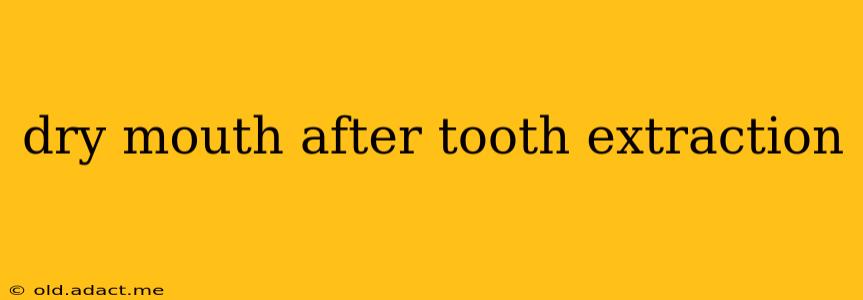Dry mouth, or xerostomia, is a common side effect after tooth extraction. The discomfort can range from mildly annoying to significantly impacting your ability to eat, speak, and even sleep. Understanding the causes, preventative measures, and effective treatments is crucial for a smoother recovery. This comprehensive guide will address everything you need to know about managing dry mouth post-extraction.
Why Does My Mouth Feel So Dry After a Tooth Extraction?
Several factors contribute to post-extraction dry mouth. The most significant is often the anesthesia. The numbing agents used during the procedure can temporarily reduce saliva production. Additionally, pain medication, especially opioids, are notorious for causing dry mouth as a side effect.
Beyond medication, the surgical trauma itself can disrupt the natural balance in your mouth, leading to reduced saliva flow. Swelling in the area can also indirectly contribute to the feeling of dryness. Finally, the post-operative instructions, which often include avoiding rinsing or spitting vigorously, can inadvertently exacerbate the problem by limiting saliva stimulation.
How Long Does Dry Mouth Last After a Tooth Extraction?
The duration of post-extraction dry mouth varies greatly depending on several factors, including the type of extraction, the individual's overall health, and the medications used. For many, the dryness subsides within a few days. However, it can persist for up to a week or two in some cases. If your dry mouth persists beyond two weeks, it's crucial to consult your dentist or oral surgeon.
What Can I Do to Prevent Dry Mouth After Tooth Extraction?
Proactive measures can significantly minimize the severity and duration of dry mouth. These include:
- Staying well-hydrated: Drinking plenty of water throughout the day is essential. Avoid dehydrating beverages like alcohol and caffeine.
- Sugar-free chewing gum or candies: Stimulating saliva production with sugar-free options can be very helpful. Choose xylitol-containing products, as xylitol has been shown to promote saliva production and inhibit bacterial growth.
- Using a humidifier: Especially during nighttime, a humidifier can add moisture to the air, reducing dryness in your mouth and throat.
- Avoiding mouthwashes (unless prescribed): Many commercial mouthwashes contain alcohol, which can further dry out your mouth.
What are Some Home Remedies for Dry Mouth After Tooth Extraction?
Several home remedies can provide temporary relief:
- Sipping water frequently: Keep a water bottle handy and sip throughout the day.
- Sucking on ice chips: Ice chips can help soothe the extraction site and provide some moisture.
- Using a lip balm: Keeping your lips moisturized can help prevent further dryness.
Are There Medical Treatments for Post-Extraction Dry Mouth?
In cases of severe or persistent dry mouth, your dentist or doctor may recommend medical interventions. These might include:
- Prescription medications: In some instances, a medication change might be necessary to address dry mouth caused by prescribed pain relievers.
- Artificial saliva substitutes: These over-the-counter products can help lubricate your mouth.
- Pilocarpine: This medication stimulates saliva production.
Can Dry Mouth After Tooth Extraction Indicate a Problem?
While dry mouth is usually a temporary side effect, persistent or severe dryness could indicate an underlying issue. If you experience significant discomfort, prolonged dryness, or other symptoms like difficulty swallowing, it's essential to contact your dentist or oral surgeon. They can rule out any complications and offer appropriate treatment.
Is it Normal to Have a Dry Mouth After a Wisdom Tooth Extraction?
Yes, dry mouth is a common side effect after any tooth extraction, including wisdom tooth removal. The same causes and treatments apply. Because wisdom tooth extractions are often more extensive procedures, you may experience more pronounced dry mouth.
How Can I Relieve Dry Mouth and Pain Simultaneously?
Managing both dry mouth and pain simultaneously requires a multi-pronged approach. Prioritize staying hydrated. Use sugar-free candies or gum to stimulate saliva production, and consider applying a topical anesthetic gel, if recommended by your dentist, to relieve pain directly. Follow your dentist's instructions regarding pain medication carefully.
By understanding the causes and implementing these preventative and treatment strategies, you can effectively manage dry mouth and achieve a comfortable recovery after tooth extraction. Remember to always consult your dentist or oral surgeon if you have any concerns.
